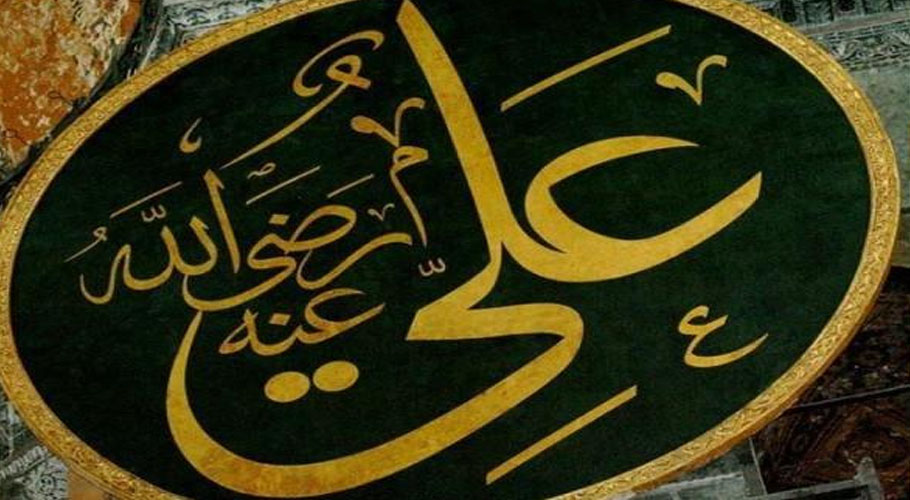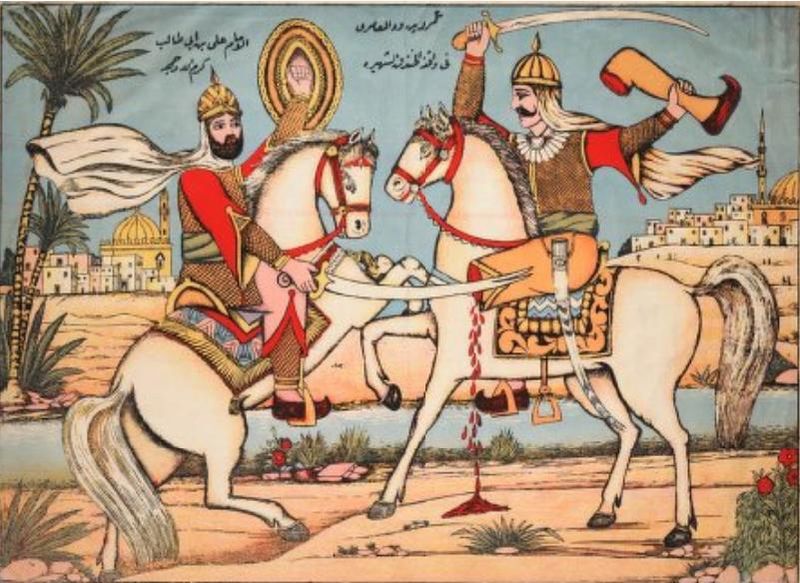Ali bin Abi Talib, may God honor his face, is the cousin of the Messenger Muhammad, may God bless him and grant him peace, and his son-in-law from his family. The fourth of the Rightly Guided Caliphs, one of the ten who were given the glad tidings of Paradise, and one of the six people of Shura. Let’s get to know more about this great personality who has been influential since her childhood.
Who Was Ali Ibn Abi Talib?
He is the companion of Ali bin Abi Talib bin Abd al-Muttalib bin Hashim bin Abd Manaf bin Qusai bin Kilab bin Luay bin Ghalib bin Fahr bin Malik bin al-Nadr bin Kinana bin Khuzaymah bin Mudraka bin Elias bin Mudar bin Nizar bin Maad bin Adnan, the cousin of the Prophet – upon him be Prayers and peace-. His mother, Fatima bint Asad bin Abd Manaf, from Bani Hashim, was the cousin of Abu Talib.
Childhood and conversion to Islam

Ibn Ishaq mentioned that Ali bin Abi Talib once entered the Prophet – upon him be blessings and peace – while he was praying with Mrs. Khadija – may God be pleased with her – and asked him about the nature of that worship. so he explained to him that it is one of the rituals of Islam. and offered him faith in his message and the unification of God, and disavowing idols. Ali hesitated to accept and wanted to consult his father about that. the Prophet hated the spread of the news of the call before he announced it himself, so the Messenger upon him be blessings and peace chose Ali between Islam, or concealing the matter and not informing anyone about it.
Ali spent that night thinking about the matter of the call until faith fell into his heart. so he went to the Prophet – upon him be peace and blessings – asking him to repeat what he called him to him the first time. so the Prophet repeated the two testimonies to him and disavowed Al-Lat and Al-Uzza. So he entered Islam, pronounced the two testimonies, and concealed his faith fearing Abu Talib.
Early Life
Ali – may God be pleased with him – was born ten years before the mission. He was brought up in the care of the Messenger of God – may God bless him and grant him peace – and he did not leave him. Abu Talib had many sons, and there was misfortune and poverty among the Quraysh at that time.
The Messenger of God – may God bless him and grant him peace – asked his uncle Al-Abbas to relieve Abu Talib, and Al-Abbas was well off. So they went to Abu Talib to relieve us of his sons so that the hardship that befell Quraish would be removed. Al-Abbas took Jaafar bin Abi Talib – may God be pleased with them both – and the Prophet – may God bless him and grant him peace – took Ali. So Jaafar stayed with Al-Abbas until he embraced Islam, and Ali stayed with the Messenger – may God bless him and grant him peace – until he embraced Islam and followed him.
His Role in The Migration to Medina
Ibn Abbas – may God be pleased with him – mentioned the role of Ali bin Abi Talib – when the polytheists wanted to ambush our master Muhammad, may God bless him and grant him peace, and kill him. Where Ali, may God be pleased with him, slept on the night of the Prophet’s migration, may God’s prayers and peace be upon him, to Medina, in the bed of the Prophet – may God’s prayers and peace be upon him.
The polytheists spent the night thinking that they were besieging the Messenger of God in his house. However, he had walked to the cave. when it was morning they went to him, and they were surprised that Ali was sleeping in his bed. so they asked him about the Prophet and He replied that he did not know his whereabouts.
Then Ali – may God be pleased with him – migrated to Medina three nights after the Prophet migrated to it. after he paid the trusts that the Messenger had – upon him be blessings and peace – to their owners. As the Prophet, may God bless him and grant him peace, commissioned him to do so.
The Role of Ali in The Military Campaigns “Ghazawat”

Ali bin Abi Talib – may God be pleased with him – participated in all the invasions that took place at the time of the Prophet – upon him be blessings and peace – except for the Battle of Tabuk. As The Prophet – may God’s prayers and peace be upon him – appointed him as caliph over Medina.
Ali, may God be pleased with him, was known for his courage and great roles in all the battles. he had many courageous stances, including the ability of Ali bin Abi Talib – may God be pleased with him – to duel Amr bin Abd Wad and overthrow him in the Battle of the Trench. after he was able to cross the trench to the side of the Muslims with a group of Quraysh knights. Ali had asked permission from the Messenger – upon him Prayers and peace – before the duel. so he gave him permission the third time and gave him his sword, dha alghafari.
Thus, Ali – may God be pleased with him – showed his courage and self-sacrifice. sacrificing and defending the Muslims and causing fear and panic among the polytheists. Amr was known for his strength and courage as well, but Ali defeated him. Ali bin Abi Talib – may God be pleased with him – was steadfast with the Prophet – may blessings and peace be upon him – on the battlefield on the day of Hunayn after the Muslims fled, and his steadfastness with other companions was one of the reasons for victory in that battle.
Election And Role As a Caliph
Ali became the fourth caliph of Islam in 656 CE, following the assassination of Uthman Ibn Affan. His reign was marked by several challenges, including a rebellion by some of his own companions, known as the Kharijites. Ali was known for his piety and his commitment to social justice, and he established several policies aimed at improving the lives of ordinary Muslims.
Ali’s reign was also marked by several military campaigns, including the Battle of the Camel and the Battle of Siffin. These conflicts were fought against other Muslim factions and were rooted in political and theological differences. Despite these challenges, Ali was able to maintain the unity of the Muslim community and establish a strong government.
Although Ali bin Abi Talib, may God be pleased with him, did not make any conquests throughout his reign. it was characterized by a lot of civil and civilizational achievements, including the organization of the police and the establishment of specialized centers to serve the public. such as the House of Grievances and the Shred of Al-Dhawal. Kufa also flourished during his reign, and schools of jurisprudence and grammar were built there. Ali bin Abi Talib, may God be pleased with him, ordered Abu Al-Aswad Al-Du’ali to form the letters of the Qur’an for the first time.
Assassination
Ali – may God be pleased with him – knew that he would die by killing. so the Prophet – may God bless him and grant him peace – gave him good tidings that he would be killed as a martyr, and he said: (Shall I not tell you of the two most wretched men? Uhaymar of Thamud who hamstrung the she-camel, and who beats you, O Ali, over this, until it is wasted, (meaning his beard) Narrated by Al-Albani in Sahih Al-Jami. he – may God be pleased with him – was martyred at the hands of Ibn Muljam, as he sat watching the place of Ali’s exit – may God be pleased with him. and when he came out one day waking the people up for prayer and saying: “Prayer is prayer”, Ibn Muljam struck him with the sword on the side of his head. and his honorable blood flowed on his beard.
Ali – may God be pleased with him – was martyred on Friday night for the seventeen nights of Ramadan of the fortieth year of migration.
Conclusion
In this article, we discussed Ali ibn Abi Talib, who was famous, may God be pleased with him, for his eloquence and wisdom. Many poems and sayings are attributed to him. It is also a symbol of courage and strength and is characterized by justice and asceticism. He is considered one of the greatest scholars of his time in knowledge and jurisprudence.
Read also:
FAQs
What was Ali ibn Abi Talib known for?
Ali - may God be pleased with him - was a brave man whose battlefields witnessed heroism and sacrifice. He had abundant knowledge and a deep understanding of the Qur’an and Sunnah. He was a wise man and a just judge. He was an eloquent orator whose expressions dripped, and his words were eloquent. he is endowed with many good qualities, such as piety, piety, modesty, humility, and chastity.
What is the nickname of Ali ibn Abi Talib?
Ali - may God be pleased with him - was nicknamed Abu al-Hasan and Abu Turab. It is a nickname given to him by the Prophet - upon him be peace and blessings - when he found him lying in the mosque and his body was hit with dust. after the robe fell off him. so the Prophet began wiping the dust off him, while he was repeating: (Get up, father of dust, rise, father of dust). Sahih Bukhari.
Because he, may God be pleased with him, never prostrated to an idol during the Jahiliyyah

